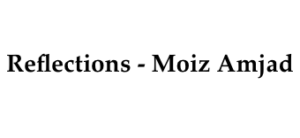Today, I would like to direct the same question to my friends, which I tried to answer for myself in the last post: “Who are you and what is the identity that you have chosen for yourself?”
Conduct an experiment: If you only ask the first part of the question, “who are you?” almost everyone that you meet will answer it by telling you their name or, sometimes, by adding their position or the designation, which they hold in their organization, or by explaining what they do. This clearly points out, on the one hand, that most people – a very large majority – have no sense of identity other than the names that they were given or other than the jobs that they are performing. While, on the other hand, it is an indication that we are, generally, so devoid of a sense of identity that we search for it in such things as our positions, designations, and achievements. However, the problem is that as a being with a conscious, as well as a conscience, we will not be satisfied with an identity given to us by someone else – even if that someone includes our parents, or elders. Neither will we be satisfied with an identity that is likely to change every time our position, work, responsibility, or social status is changed by the circumstances.
Thus, our sense of identity not only gives us stability in our ever changing, unpredictable, and complex world and circumstances, it also gives a meaning to our lives; it provides us the strength to face our share of failures and difficult times in life; it gives us the courage to do what we understand to be right, even when the costs of doing right are high. In a way, it makes us fully human – conscious and conscientious – and connects us to a purpose larger than ourselves.
As a side note, it may be interesting to know that one of the reasons ascribed to the recent increase in the incidence of depression and even suicide – which is indicative of complete hopelessness and despair – is lack of meaning in one’s life. Viktor Frankl’s treatise, ‘Man’s Search for Meaning’ and the subsequent recognition of ‘Logotherapy’ as a branch of Psychology, allows me to say with confidence that striving to find meaning in life is the primary, most powerful motivating driving force in humans.
The idea of a lack of consciously developed identity and a lack of meaning in life reminds me of the large number of students – especially aspiring medical students – who invariably call me in a state of extreme hopelessness and distress, because of their low grades, which are insufficient for pursuing their further studies to become doctors. They clearly sound as if they have lost all sense of identity from their lives. The position and the emotional state of adults is not significantly different, when they are removed from their long-standing, cherished positions.
I do not intend to give the impression that in my opinion, such incidents in life should not be a cause of disturbance and sadness. They most definitely are and probably will continue to be. But, that is life, isn’t it? Things – unpleasant and unwanted – are also going to happen. Having a strong sense of meaning and self-identity will greatly support us in going through the turbulent times of life. This is precisely the message that I have discerned from Viktor Frankl’s ‘Man’s search for Meaning.’
Coming back to the point, I would like you to answer the question “Who are you and what is the identity that you have chosen for yourself?”
Take some time in trying to answer this question. Look past yourself and beyond your immediate needs, desires, and concerns. Look at your surroundings and see what is it that you care enough to contribute to the people around you. Is there any way that you can slightly reduce anyone’s suffering? Is there any thing that you feel moved enough to contribute to those for whom your contribution is of much more value than it costs you? Your identity doesn’t have to be something that challenges the whole world. It can be as humble as making a small difference in a single life – one life at a time. Something that you are moved to contribute as you go through all the ups and downs of your own life. Something that provides you a stable and a permanent identity – at least in your own eyes – irrespective of the changes in your position, responsibility, job, or status.
December 14, 2019
(Lahore, Pakistan)
